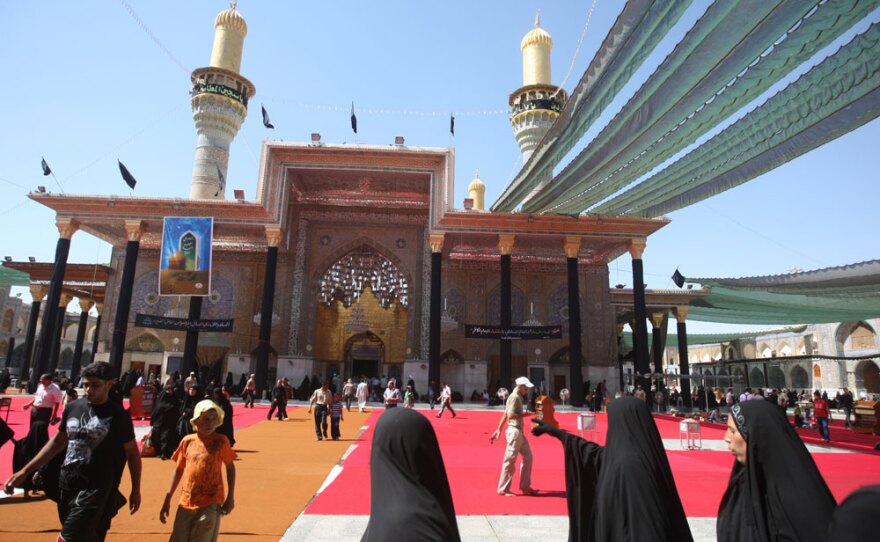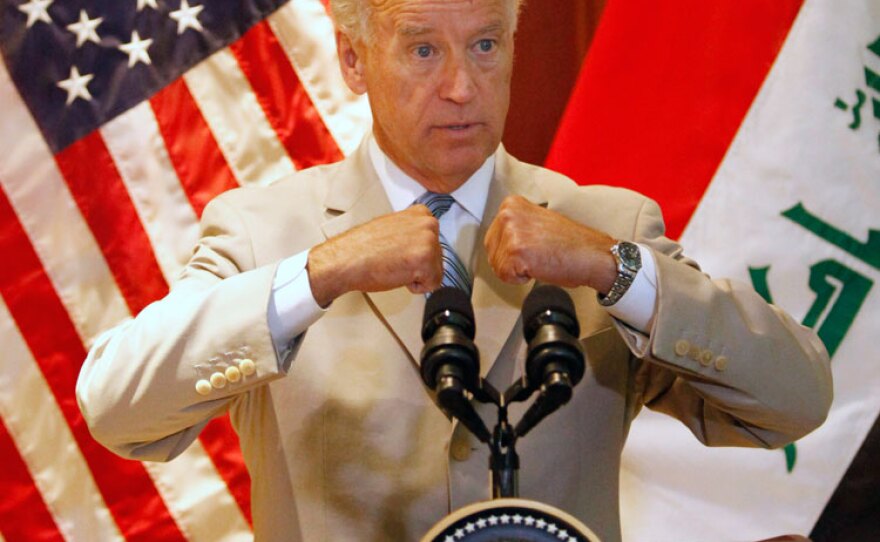Next week, Iraq's parliament is supposed to convene and begin the process of choosing a prime minister.
But some are saying that's not a real deadline and the political stalemate gripping parliament will continue into the fall. It has been nearly four months since Iraqis voted in a general election, but the results were so close that no party won enough seats to form a government on its own.
Vice President Joe Biden made a surprise visit to Iraq over the weekend to encourage Iraqi politicians to come to an agreement. But the political impasse is complicated.
Layers Of Conflict
In the March 7 elections, the party of the sitting prime minister, Nouri al-Maliki, lost by a narrow margin to the party of a former prime minister, Ayad Allawi.
Since then, Maliki, a Shiite, has aligned with other Shiite parties to form what's being called a super-Shiite bloc. With the largest number of seats in Parliament, this group is claiming the right to form a government.
But Allawi, a secular Shiite who has the backing of many of Iraq's Sunnis, says that's not fair. After all, he won the election, says the spokeswoman for his Iraqiya party, Maysoun al-Damalouji.
In a telephone interview, she said there's nothing wrong with the super-Shiite bloc holding meetings. "The problem is when they try to block Iraqiya from forming the government," she says.
So that's the conflict between Maliki and Allawi. But there's also conflict within Maliki's super-Shiite bloc. Many Shiites want Maliki out and a new Shiite candidate for prime minister in. But they can't agree on who this candidate should be.
'A Dictator Inside'

On the streets of Baghdad, music of mourning blares from loudspeakers as Shiite pilgrims march toward the Kadhimiya shrine, where two revered imams are buried.
Even here, the divisions are clear. Young men wearing all black have set up checkpoints to search pilgrims and check IDs. They are loyal to the radical Shiite cleric Muqtada al-Sadr.
Iraqi policemen, on Maliki's payroll, have their own checkpoints just a few paces away.
Ibrahim Sumydai, an Iraqi political analyst, says the problem is that none of the factions here is willing to let go of power and form an opposition instead. He says this mentality is a holdover from the era of Saddam Hussein.
"There is a dictator inside each one of them. It is a culture," he says. "They thought it is their last chance to be in the power, to get the power, and [stay] in the power forever."
Over the weekend, the visiting U.S. vice president said the Iraqi government should represent all people -- Shiites, Sunnis and Kurds -- not just one group.
Biden made it clear that while America's military operation is winding down -- with the number of troops steadily decreasing -- the civilian operation is ramping up.
"The United States is committed -- we're committed to cement that relationship through economic, political and diplomatic cooperation, not just by the use of arms," Biden said.
Diverging Opinions
Analysts here say this may be what the American people want to hear, but not necessarily what the Iraqis want to hear.
On one hand, the radical Islamists, both Shiite and Sunni, want the U.S. military all the way out of Iraq. Others say American soldiers should stay, to protect people against the radicals and to ensure that whoever takes power does not become another dictator.
Abdulhalek Zengela, a Kurdish member of parliament, says Biden was his usual, frank self with Iraqi leaders, and that's the way the Americans should remain.
"They have to remind us toughly that Iraq still needs allies. And without the help of the allies, Iraq can not overcome its political, cultural, economic crisis that Saddam put Iraq in," he says through an interpreter.
Back outside, Shiite pilgrims will march to the Kadhimiya shrine all week. It's already 110 degrees and only getting hotter. Young boys spray water on pilgrims, and volunteers man tents where the faithful can step out of the sun.
Two women who have walked for seven days from the southern city of Kut say they are not worried about security, despite the fact that earlier Monday, two bombs targeted pilgrims in another part of Baghdad.
One nods to the Sadr loyalists dressed in black. We'll be taken care of, she says, by our own people.
Copyright 2022 NPR. To see more, visit https://www.npr.org. 9(MDAzMjM2NDYzMDEyMzc1Njk5NjAxNzY3OQ001))







